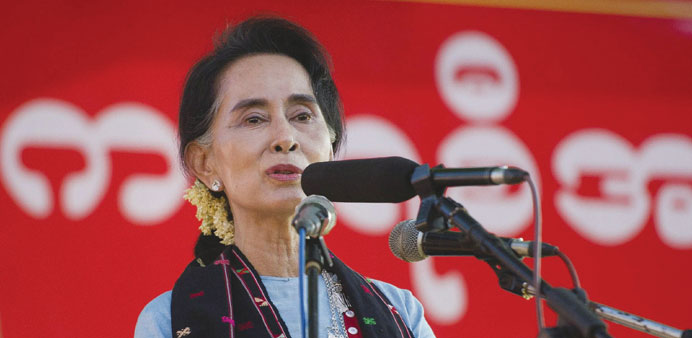Aung San Suu Kyi delivers a speech near Winemaw town of Kachin state yesterday.
Aung San Suu Kyi yesterday told voters in war-torn Kachin state that her opposition party represents the “whole” of Myanmar and not just the majority ethnic group, as she courts the crucial minority vote ahead of November’s landmark polls.
Hundreds of ethnic Kachin people cheered as Suu Kyi addressed the crowd on the outskirts of Winemaw town, near the state capital Myitkyina, as the National League for Democracy (NLD) steps-up its campaign for the first countrywide election it has contested in 25 years.
“The NLD does not represent any one ethnic group, including the (majority) Bamar ethnic group. We represent the whole union,” she told voters in the former junta-run nation where minorities make up around a third of the 51mn population.
Kachin, together with Myanmar’s six other minority-dominated states, has become a key election battleground as ethnic parties are expected to make strong gains in the November 8 polls.
Suu Kyi has been criticised for failing to build alliances with these groups and on Friday the NLD was trying to woo minority voters in an election the party is tipped to win if free and fair.
“If you want change, please vote for the NLD,” she urged the crowd.
Their restive state has seen around 100,000 people displaced since fighting reignited between the Myanmar military and ethnic rebels from the Kachin Independence Army (KIA) in 2011.
Unsurprisingly the issue of self-administration was one of the first raised in questions from the crowd to the Nobel Laureate and it’s one she avoided
answering directly.
An NLD government would introduce the “system that people want, with their support and cooperation”, the 70-year-old said carefully.
Myanmar’s elections are seen as a crucial test of democratic progress in a nation that only emerged in 2011 from half a century of military rule.
But despite the raft of political and economic reforms launched under President Thein Sein’s quasi-civilian government, Myanmar is still beset by bitter conflicts for greater autonomy in its remote ethnic pockets.
Many of these regions have been fighting since the nation’s independence from British colonial rule in 1948, and securing a countrywide ceasefire deal before the polls has been at the heart of Naypyidaw’s reform drive.
But those hopes have crumbled as several major groups, including the KIA, have vowed not to ink the deal without the inclusion of all rebel forces—notably a clutch of smaller organisations locked in conflict with the army.
Clashes between the KIA and government troops have intensified in recent weeks as the ceasefire negotiations reach a critical moment.
The government is still pushing for a deal to be signed this month, in a move observers believe could split the ethnic armies.
Around a third of Myanmar’s population identify as one of the country’s 135 minority groups, which have their own languages and traditions.
Though a member of the majority Bamar ethnic group, veteran activist Suu Kyi drew out a stream of supporters yesterday.
In Winemaw, NLD activists were busy selling T-shirts emblazoned with the democracy icon’s image as local supporters waved flags adorned with the party’s fighting peacock and star symbol.
The abundant wealth of natural resources in Kachin, wedged between India and China, is seen both as an impetus for war and an impediment to halting it.
Home to lucrative reserves of timber, jade and gold, the state’s riches have not passed down to most of its impoverished
residents.

